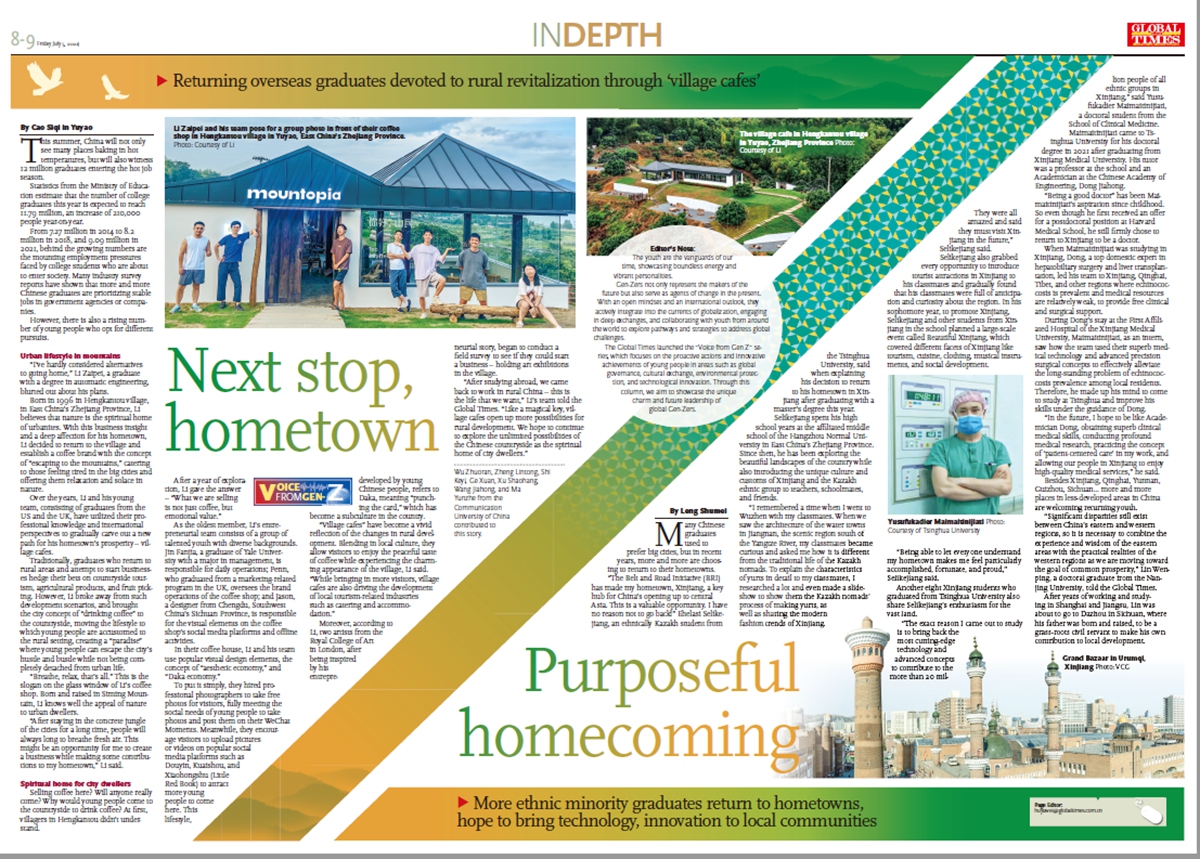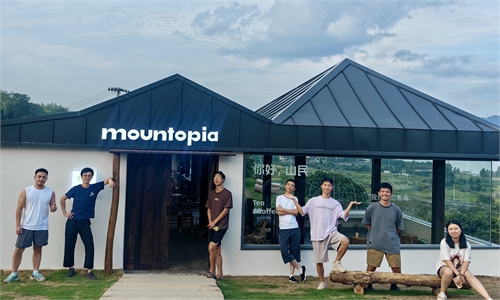IN-DEPTH / IN-DEPTH
More ethnic minority graduates return to hometowns, hope to bring technology, innovation to local communities
Purposeful homecoming
Editor's Note:
The youth are the vanguards of our time, showcasing boundless energy and vibrant personalities.
Gen-Zers not only represent the makers of the future but also serve as agents of change in the present. With an open mindset and an international outlook, they actively integrate into the currents of globalization, engaging in deep exchanges, and collaborating with youth from around the world to explore pathways and strategies to address global challenges.
The Global Times launched the "Voice from Gen Z" series, which focuses on the proactive actions and innovative achievements of young people in areas such as global governance, cultural exchange, environmental protection, and technological innovation. Through this column, we aim to showcase the unique charm and future leadership of global Gen-Zers.

Many Chinese graduates used to prefer big cities, but in recent years, more and more are choosing to return to their hometowns.
"The Belt and Road Initiative (BRI) has made my hometown, Xinjiang, a key hub for China's opening up to central Asia. This is a valuable opportunity. I have no reason not to go back!" Ehelasi Selikejiang, an ethnically Kazakh student from the Tsinghua University, said when explaining his decision to return to his hometown in Xinjiang after graduating with a master's degree this year.
Selikejiang spent his high school years at the affiliated middle school of the Hangzhou Normal University in East China's Zhejiang Province. Since then, he has been exploring the beautiful landscapes of the country while also introducing the unique culture and customs of Xinjiang and the Kazakh ethnic group to teachers, schoolmates, and friends.
"I remembered a time when I went to Wuzhen with my classmates. When we saw the architecture of the water towns in Jiangnan, the scenic region south of the Yangtze River, my classmates became curious and asked me how it is different from the traditional life of the Kazakh nomads. To explain the characteristics of yurts in detail to my classmates, I researched a lot and even made a slideshow to show them the Kazakh nomads' process of making yurts, as well as sharing the modern fashion trends of Xinjiang. They were all amazed and said they must visit Xinjiang in the future," Selikejiang said.
Selikejiang also grabbed every opportunity to introduce tourist attractions in Xinjiang to his classmates and gradually found that his classmates were full of anticipation and curiosity about the region. In his sophomore year, to promote Xinjiang, Selikejiang and other students from Xinjiang in the school planned a large-scale event called Beautiful Xinjiang, which covered different facets of Xinjiang like tourism, cuisine, clothing, musical instruments, and social development.
"Being able to let everyone understand my hometown makes me feel particularly accomplished, fortunate, and proud," Selikejiang said.
Another eight Xinjiang students who graduated from Tsinghua University also share Selikejiang's enthusiasm for the vast land.
"The exact reason I came out to study is to bring back the most cutting-edge technology and advanced concepts to contribute to the more than 20 million people of all ethnic groups in Xinjiang," said Yusufukadier Maimaitinijiati, a doctoral student from the School of Clinical Medicine.
Maimaitinijiati came to Tsinghua University for his doctoral degree in 2021 after graduating from Xinjiang Medical University. His tutor was a professor at the school and an Academician at the Chinese Academy of Engineering, Dong Jiahong.
"Being a good doctor" has been Maimaitinijiati's aspiration since childhood. So even though he first received an offer for a postdoctoral position at Harvard Medical School, he still firmly chose to return to Xinjiang to be a doctor.

When Maimaitinijiati was studying in Xinjiang, Dong, a top domestic expert in hepatobiliary surgery and liver transplantation, led his team to Xinjiang, Qinghai, Tibet, and other regions where echinococcosis is prevalent and medical resources are relatively weak, to provide free clinical and surgical support.
During Dong's stay at the First Affiliated Hospital of the Xinjiang Medical University, Maimaitinijiati, as an intern, saw how the team used their superb medical technology and advanced precision surgical concepts to effectively alleviate the long-standing problem of echinococcosis prevalence among local residents. Therefore, he made up his mind to come to study at Tsinghua and improve his skills under the guidance of Dong.
"In the future, I hope to be like Academician Dong, obtaining superb clinical medical skills, conducting profound medical research, practicing the concept of 'patient-centered care' in my work, and allowing our people in Xinjiang to enjoy high-quality medical services," he said.
Besides Xinjiang, Qinghai, Yunnan, Guizhou, Sichuan... more and more places in less-developed areas in China are welcoming returning youth.
"Significant disparities still exist between China's eastern and western regions, so it is necessary to combine the experience and wisdom of the eastern areas with the practical realities of the western regions as we are moving toward the goal of common prosperity," Lin Wenping, a doctoral graduate from the Nanjing University, told the Global Times.
After years of working and studying in Shanghai and Jiangsu, Lin was about to go to Dazhou in Sichuan, where his father was born and raised, to be a grass-roots civil servant to make his own contribution to local development.

The youth are the vanguards of our time, showcasing boundless energy and vibrant personalities.
Gen-Zers not only represent the makers of the future but also serve as agents of change in the present. With an open mindset and an international outlook, they actively integrate into the currents of globalization, engaging in deep exchanges, and collaborating with youth from around the world to explore pathways and strategies to address global challenges.
The Global Times launched the "Voice from Gen Z" series, which focuses on the proactive actions and innovative achievements of young people in areas such as global governance, cultural exchange, environmental protection, and technological innovation. Through this column, we aim to showcase the unique charm and future leadership of global Gen-Zers.

Yusufukadier Maimaitinijiati Photo: Courtesy of Tsinghua University
Many Chinese graduates used to prefer big cities, but in recent years, more and more are choosing to return to their hometowns.
"The Belt and Road Initiative (BRI) has made my hometown, Xinjiang, a key hub for China's opening up to central Asia. This is a valuable opportunity. I have no reason not to go back!" Ehelasi Selikejiang, an ethnically Kazakh student from the Tsinghua University, said when explaining his decision to return to his hometown in Xinjiang after graduating with a master's degree this year.
Selikejiang spent his high school years at the affiliated middle school of the Hangzhou Normal University in East China's Zhejiang Province. Since then, he has been exploring the beautiful landscapes of the country while also introducing the unique culture and customs of Xinjiang and the Kazakh ethnic group to teachers, schoolmates, and friends.
"I remembered a time when I went to Wuzhen with my classmates. When we saw the architecture of the water towns in Jiangnan, the scenic region south of the Yangtze River, my classmates became curious and asked me how it is different from the traditional life of the Kazakh nomads. To explain the characteristics of yurts in detail to my classmates, I researched a lot and even made a slideshow to show them the Kazakh nomads' process of making yurts, as well as sharing the modern fashion trends of Xinjiang. They were all amazed and said they must visit Xinjiang in the future," Selikejiang said.
Selikejiang also grabbed every opportunity to introduce tourist attractions in Xinjiang to his classmates and gradually found that his classmates were full of anticipation and curiosity about the region. In his sophomore year, to promote Xinjiang, Selikejiang and other students from Xinjiang in the school planned a large-scale event called Beautiful Xinjiang, which covered different facets of Xinjiang like tourism, cuisine, clothing, musical instruments, and social development.
"Being able to let everyone understand my hometown makes me feel particularly accomplished, fortunate, and proud," Selikejiang said.
Another eight Xinjiang students who graduated from Tsinghua University also share Selikejiang's enthusiasm for the vast land.
"The exact reason I came out to study is to bring back the most cutting-edge technology and advanced concepts to contribute to the more than 20 million people of all ethnic groups in Xinjiang," said Yusufukadier Maimaitinijiati, a doctoral student from the School of Clinical Medicine.
Maimaitinijiati came to Tsinghua University for his doctoral degree in 2021 after graduating from Xinjiang Medical University. His tutor was a professor at the school and an Academician at the Chinese Academy of Engineering, Dong Jiahong.
"Being a good doctor" has been Maimaitinijiati's aspiration since childhood. So even though he first received an offer for a postdoctoral position at Harvard Medical School, he still firmly chose to return to Xinjiang to be a doctor.

Grand Bazaar in Urumqi, Xinjiang Photo: VCG
When Maimaitinijiati was studying in Xinjiang, Dong, a top domestic expert in hepatobiliary surgery and liver transplantation, led his team to Xinjiang, Qinghai, Tibet, and other regions where echinococcosis is prevalent and medical resources are relatively weak, to provide free clinical and surgical support.
During Dong's stay at the First Affiliated Hospital of the Xinjiang Medical University, Maimaitinijiati, as an intern, saw how the team used their superb medical technology and advanced precision surgical concepts to effectively alleviate the long-standing problem of echinococcosis prevalence among local residents. Therefore, he made up his mind to come to study at Tsinghua and improve his skills under the guidance of Dong.
"In the future, I hope to be like Academician Dong, obtaining superb clinical medical skills, conducting profound medical research, practicing the concept of 'patient-centered care' in my work, and allowing our people in Xinjiang to enjoy high-quality medical services," he said.
Besides Xinjiang, Qinghai, Yunnan, Guizhou, Sichuan... more and more places in less-developed areas in China are welcoming returning youth.
"Significant disparities still exist between China's eastern and western regions, so it is necessary to combine the experience and wisdom of the eastern areas with the practical realities of the western regions as we are moving toward the goal of common prosperity," Lin Wenping, a doctoral graduate from the Nanjing University, told the Global Times.
After years of working and studying in Shanghai and Jiangsu, Lin was about to go to Dazhou in Sichuan, where his father was born and raised, to be a grass-roots civil servant to make his own contribution to local development.


